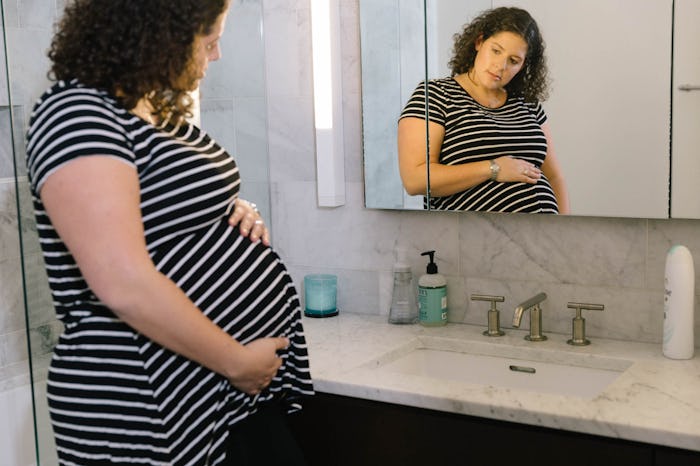Life
Here's Why You May Want A Doula During Your High-Risk Pregnancy
Pregnancy can often feel like a solo effort — after all, you are the one growing a human. But venture into any labor and delivery room and you will see a team of doctors, nurses, midwives, and loving partners who are all working together to ensure a healthy outcome for you and your little one. For some women, a high-risk pregnancy gets added into the mix, making that team all the more important as you navigate questions and concerns. Extra help at your side might be nice, but can you have a doula if you're high risk?
"Doulas are wonderful for many women to have at their births and throughout their pregnancies," Lamaze Certified Childbirth Educator (LCCE) and Fellow of American College of Childbirth Educators (FACCE) Deena Blumenfeld of Shining Light Prenatal Education tells Romper in an email interview. "For a mother whose pregnancy is classified as high-risk, a doula is often a good idea."
Blumenfield, who is also a doula, explains that high-risk pregnancies can mean more medical interventions during birth and postpartum. "Having the emotional support of a doula is key in tough situations," she says. "She can reduce stress for the parents, making a tough situation easier." She adds that doulas can also help a mother and her partner advocate for their needs, as well as their baby's needs, or provide prompts for questions that will help them make fully informed decisions.
Dr. Sherry Ross, OB-GYN and women’s health expert at Providence Saint John’s Health Center in Santa Monica, California, agrees, adding that doulas "are a wonderful addition to provide support and comfort to a woman in labor." She tells Romper, "Doulas can definitely be a part of low and high-risk pregnancies as 'co-team captain.' [But] it’s always best to have doulas work together with an obstetrician, especially if she has a high-risk pregnancy."
Like Ross, Dr. Sheeva Talebian, co-founder of Truly-MD.com and director of third party reproduction at the New York branch of The Colorado Center for Reproductive Medicine tells Romper in an email interview that doulas are an effective member of a woman's support team, "even if the labor needs to be medically augmented." She does caution, however, that a doula will most often not be allowed into an operating room in the event of a C-section unless you opt to have your doula versus a partner or family member in the room.
"Some high risk conditions do carry a higher risk of cesarean section," Dr. G. Thomas Ruiz, OB-GYN at Orange Coast Memorial Medical Center in Fountain Valley, California tells Romper in an email interview. "But the role of the doula is to be supportive of the laboring mother whether she has a vaginal delivery or C-section."
In fact, says Dr. Sunny Jun, an OB-GYN and the co-founder and co-medical director of the San Francisco branch of The Colorado Center for Reproductive Medicine, doulas can be very effective at providing emotional support and further information if medical interventions — like C-sections — become necessary during high-risk pregnancies
"As long as the patients and doulas are open to evidence-based interventions in high-risk pregnancies without interfering with the overall medical care that may be necessary, then the added emotional support these women will receive from their doulas may only help these patients better their overall experience, regardless of the outcome," Jun tells Romper.
Talebian and Jun agree that it is necessary for a plan to be discussed with your obstetrician or midwife in order to set clear expectations for how your doula will support you. "It is extremely important that these patients, their OB-GYNs, and their doulas are all in agreement with the goal of having a healthy, successful outcome," Jun says.
And a healthy you and baby is what this is all about, right?
Check out Romper's new video series, Romper's Doula Diaries:
Check out the entire Romper's Doula Diaries series and other videos on Facebook and the Bustle app across Apple TV, Roku, and Amazon Fire TV.
